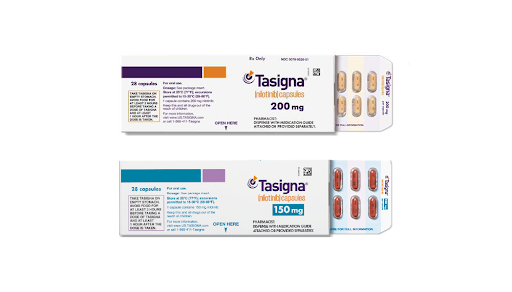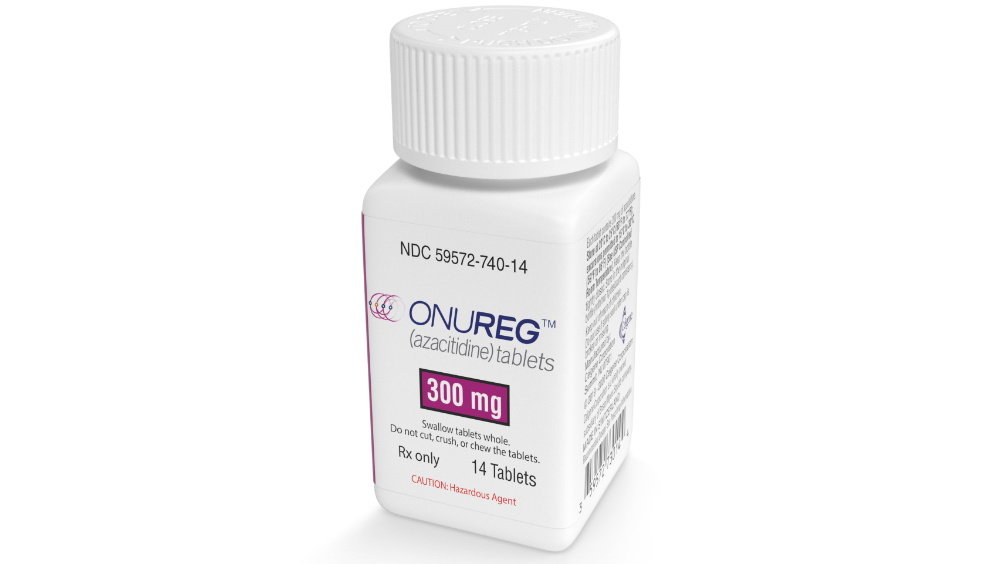Tasigna (nilotinib) vs Onureg (azacitidine)
Tasigna (nilotinib) vs Onureg (azacitidine)
Tasigna (nilotinib) is a targeted therapy known as a tyrosine kinase inhibitor, specifically used for the treatment of chronic myeloid leukemia (CML) with Philadelphia chromosome-positive (Ph+) in adults and children. Onureg (azacitidine) is an oral hypomethylating agent indicated for the continued treatment of patients with acute myeloid leukemia (AML) who achieved first complete remission (CR) or complete remission with incomplete blood count recovery (CRi) following intensive induction chemotherapy and are not able to complete intensive curative therapy. When deciding between these two medications, it is crucial to consider the specific type of leukemia being treated, the patient's overall health status, and the treatment goal, as Tasigna is not interchangeable with Onureg due to their distinct mechanisms of action and indications.
Difference between Tasigna and Onureg
| Metric | Tasigna (nilotinib) | Onureg (azacitidine) |
|---|---|---|
| Generic name | Nilotinib | Azacitidine |
| Indications | Chronic myeloid leukemia (CML) | Acute myeloid leukemia (AML) |
| Mechanism of action | Tyrosine kinase inhibitor | DNMT inhibitor |
| Brand names | Tasigna | Onureg |
| Administrative route | Oral | Oral |
| Side effects | Rash, pruritus, nausea, fatigue, headache, constipation, diarrhea, cough, muscle pain | Nausea, vomiting, diarrhea, constipation, neutropenia, thrombocytopenia, anemia, fatigue, febrile neutropenia |
| Contraindications | Hypersensitivity to nilotinib, long QT syndrome, electrolyte abnormalities | Hypersensitivity to azacitidine or mannitol, advanced malignant hepatic tumors |
| Drug class | Tyrosine kinase inhibitor | Hypomethylating agent |
| Manufacturer | Novartis | Bristol Myers Squibb |
Efficacy
Efficacy of Tasigna (Nilotinib) in Treating Leukemia
Tasigna (nilotinib) is a targeted therapy known as a tyrosine kinase inhibitor (TKI) used primarily in the treatment of chronic myeloid leukemia (CML). It is specifically designed to inhibit the BCR-ABL tyrosine kinase, the abnormal protein responsible for the uncontrolled proliferation of leukemic cells in CML. Clinical trials have demonstrated that Tasigna is highly effective in achieving and maintaining a hematologic and cytogenetic response in patients with CML, particularly in the chronic phase. Patients treated with Tasigna often experience a significant reduction in the number of leukemic cells in the blood and bone marrow, and many achieve a complete cytogenetic response, indicating no detectable cancerous cells.
Studies have also shown that Tasigna is effective in patients who have developed resistance or intolerance to prior therapy, including imatinib (another TKI). In these cases, Tasigna has been found to provide a therapeutic alternative with a different toxicity profile. It is important to note that the efficacy of Tasigna can be influenced by the presence of certain genetic mutations in the BCR-ABL gene, which may confer resistance to the drug. Therefore, genetic testing is often recommended to guide treatment decisions and optimize outcomes.
Efficacy of Onureg (Azacitidine) in Treating Leukemia
Onureg (azacitidine) is an oral hypomethylating agent approved for the continued treatment of adults with acute myeloid leukemia (AML) who achieved first complete remission (CR) or complete remission with incomplete blood count recovery (CRi) following intensive induction chemotherapy and are not able to complete intensive curative therapy. Azacitidine works by inhibiting DNA methyltransferases, leading to the hypomethylation of DNA and the reactivation of silenced genes that are important for the control of cell growth. This mechanism of action can induce cellular differentiation or apoptosis in leukemic cells, thereby reducing the leukemic burden.
The efficacy of Onureg in AML was demonstrated in a pivotal phase III clinical trial, which showed that maintenance therapy with azacitidine significantly improved overall survival and relapse-free survival compared to placebo in patients with AML in remission. The results indicate that Onureg can be an important therapeutic option for patients with AML who are in remission but are not candidates for intensive post-remission chemotherapy or bone marrow transplantation. It is noteworthy that Onureg is not indicated for the initial treatment of AML but is used as a maintenance therapy to prolong the duration of remission.
Regulatory Agency Approvals
Tasigna
-
European Medical Agency (EMA), European Union

-
Food and Drug Administration (FDA), USA

-
Health Canada

-
Pharmaceuticals and Medical Devices Agency (PMDA), Japan

-
Therapeutic Goods Administration (TGA), Australia

-
Medsafe (NZ)

Onureg
-
Food and Drug Administration (FDA), USA

Access Tasigna or Onureg today
If Tasigna or Onureg are not approved or available in your country (e.g. due to supply issues), you can access them via Everyone.org.
How it works

Make an enquiry
Choose the medicine you want to buy, answer a couple of questions, and upload your prescription to speed things up. We’ll get back to you within 24 hours.


Make an enquiry
Choose the medicine you want to buy, answer a couple of questions, and upload your prescription to speed things up. We’ll get back to you within 24 hours.


Breeze through the paperwork
We'll guide you through the required documents for importing unapproved medicine, ensuring you have all the necessary information.


Get a personalized quote
We’ll prepare a quote for you, including medicine costs and any shipping, administrative, or import fees that may apply.


Receive your medicine
Accept the quote and we’ll handle the rest - sourcing and safely delivering your medicine.

Some text on this page has been automatically generated. Speak to your physician before you start a new treatment or medication.
Let's talk
If you have any questions, call us or send us a message through WhatsApp or email:
Contact us




